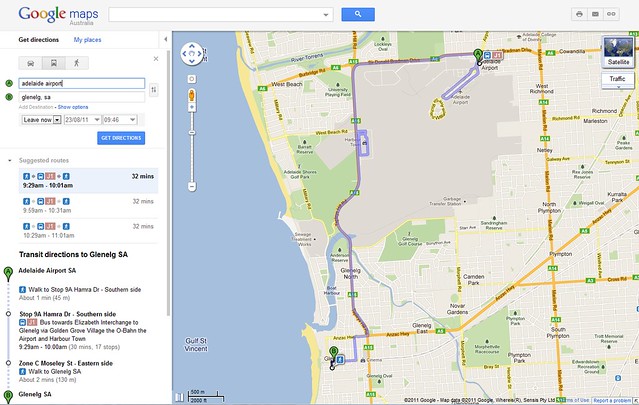The Public Transport Users Association (PTUA) has learnt that moves are underway to include Melbourne’s public transport timetables in Google Transit, but it seems there are no plans to release timetable data publicly.
PTUA President Daniel Bowen said that Google Transit had timetable data for over four hundred cities around the world[1], including all services in Perth and Adelaide, making public transport trips easier to plan. Part of the popular Google Maps service, Google Transit provides trip-planning capabilities, and many PTUA members have remarked that it is easier to use than Melbourne’s official Metlink journey planner, including on portable devices such as smartphones.
“Years after we suggested that Melbourne be added, we’ve now learnt that the Department of Transport has met with Google and it’s underway. At last, it seems it will – eventually – happen”, said Mr Bowen. “When it finally arrives, it will be a big plus to passengers.”
But Mr Bowen said that public transport timetable data should be made freely available for other software developers to use.
“Getting the information out there is a way of better promoting public transport, particularly to gadget-loving passengers, who would be only too happy to give up carrying paper timetables in favour of checking schedules on their phone or iPad.
“Adding Melbourne’s timetables to Google Transit will be very welcome, but otherwise, the government is treating public transport timetables as though they were a state secret,” said Mr Bowen. “This information ultimately belongs to the public and should be freely available to anyone who has an interest in using such data.”
Metlink’s TransNet database, which contains timetable and station/stop information for the whole of Victoria, was publicly available for a short time in 2010 as part of the ‘App My State’, but the data has since been removed from the state government’s web site.[2]
“Public transport authorities should be helping spread information about their services, whether it be providing it for Google Transit or simply releasing the data publicly for software developers to use”, said Mr Bowen.
The PTUA is calling for the full database to be released publicly, along with regular updates. The data should be made available under a non-restrictive license such as Creative Commons Attribution 2.5 Australia, which already applies to other data released by the Victorian government[3].
“There are developers out there who would like access to this data. If someone else can come up with a better app than Metlink or the government, to help more people make better use of public transport, then so be it.”
Mr Bowen said that unofficial timetable software such as Train Trapper and Tram Hunter for Android phones were examples of public transport applications on platforms that had until recently been ignored by Metlink and the operators. “But because these developers have to trawl the timetable data from unofficial sources, its accuracy can’t be guaranteed.”
The Victorian Government has previously said that it ‘supports the release of PSI (Public Sector Information) for re-use with the expectation it will lead to increased commercial activity, provide primary data to researchers in a wide range of disciplines, and increase transparency of government in Victoria.'[4]
“Public transport is paid for by tax payers and passengers. This data belongs to the people of Victoria, and the users of our public transport system. Along with other data, should not be locked away in a secret filing cabinet inside the Department of Transport,” Mr Bowen concluded.
[1] http://www.google.com/intl/en/landing/transit/text.html
[2] http://www.data.vic.gov.au/raw_data/transnet-metlink-database/50
[3] http://www.data.vic.gov.au/cms/copyright/39
[4] http://www.dbi.vic.gov.au/corporate-governance/access-to-public-sector-information – response to Parliamentary inquiry


